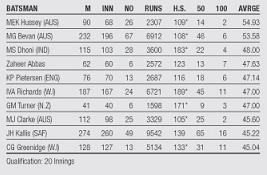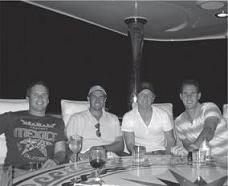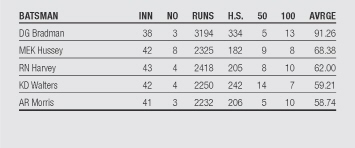Mr Cricket (25 page)

Mental toughness is the ability to watch each single delivery with the only focus being on the ball coming out of the bowler's hand.
The one-day match between Australia and South Africa in Johannesburg in March 2006 could well go down in history as the greatest, if not the most bizarre, ever played. Throughout the Australian summer John Buchanan had kept challenging our team to score 400 in a one-dayer. We kept laughing at him because it seemed to us that there was no way possible this could be done. Once the field goes back you simply cannot hit boundaries without taking too much risk, meaning that the constant flow of fours and sixes you need to reach a score like that would not be possible. However, John kept telling us we could score 400 in 50 overs. âThis team has the skills to do it,' he would say. âYou just have to believe you can.'
The conditions for this particular game in Johannesburg were absolutely perfect for batting. We batted first and got off to a flying start. Ricky Ponting was going crazy with the bat and I got the chance to move up the order because Punter wanted a left-hander in early to take advantage of the short-leg side boundary at one end. Damien Martyn, Andrew Symonds and Michael Clarke were due to come in after me. Quite an order. So with Ricky hitting the ball everywhere and more awesome batsmen to come, I concluded there was no need for me to be overly cautious and I began to try to copy what Ricky was doing. I started slogging the ball and, like my captain, kept managing to find the gaps and hit fours.
Ricky went on to knock an incredible 164 off 105 balls and I got out for 81 from 51. More importantly, we reached 400, and I recall looking at John, who was sitting in the stand with the biggest smile on his face, a kind of âI told you so' look. Remarkably, there were still some overs to face and, by the end Simmo and Brett Lee had smashed the hapless South Africans to finish the innings on 434.
HIGHEST ONE DAY INTERNATIONAL BATTING AVERAGE

In the context of the series, it was a magnificent effort to put on a score like that. We'd been hammered in the first two games and fought our way back to just win the third and fourth games to level the series at two-all. This was now the last game, the decider in a series we desperately wanted to win, especially as South Africa was hot on our heels as the world's best limited-overs team. With such a massive total on the board, we believed there was virtually no chance of us losing. We were bursting with confidence and I remember thinking, âWe've just scored 434 runs! How good is this?'
At the change of innings Ricky got us together in a huddle. Yes, we had every right to have our tails up. We had accomplished something quite special. But the game wasn't over and the fact that we'd put on a huge score should not mean we could take our foot off the pedal. Ricky told us to take our minds completely off the score and treat our bowling and fielding effort as though
we were about to try to defend 200. The boys took in what Ricky said, we were completely switched on, the feeling was positive and when we started bowling the guys were charging in for every ball. We wanted to bury South Africa and, when we broke through early, it appeared we were on track to do just that.
Soon afterwards, however, things started to turn. The South Africans got a good partnership together, with Graeme Smith and Herschelle Gibbs really motoring along. We tried various tactics to slow them down but it seemed there was nothing we could do to stem the flow of runs. Up on the scoreboard they put up a graph showing how the two teams were matched at the same point in their respective innings. Somehow they were 20 or 30 runs ahead of us at the same time! The crowd was going completely bananas and the South African batsmen kept hitting fours and sixes. I was a little worried at the speed their innings was moving along, but in the back of my mind I still believed that just one or two quick wickets would stop them in their tracks. The problem was that the wicket we needed wasn't looking very likely. No matter what we threw at them, they kept scoring runs at a frantic pace. They did have some good fortune: we'd move a fielder one way and the next ball the batsman would get an edge to where that fielder had been, an inside edge would go for four or a fielder would take a catch but fall over the boundary. Call it luck, if you like, but all the same the South Africans batted brilliantly and went on to record a memorable win, stealing our world record within just a few hours and claiming the series in stunning style.
Do it now, rather than waiting â wishing you had, once your game is over.
I was a bit numb after the game. What had enabled the South Africans, psychologically, to be able to recover from such a belting and then mow down a score that had never been chased before? I spoke with Graeme after the game and asked him what he had said to his team before they batted. It wasn't all that surprising for me to hear that Graeme hadn't done any talking in the dressing room as he was still in shock from our rampage. However, he did say their coach, Mickey Arthur, had got up and said: âRight boys, I know a win is unlikely but let's work out what position we need to be in to give ourselves a chance.' They concluded that if they could get to within 200 runs with 20 overs to go â which would equate to about 230 off 30 overs â it would give them a slight sniff of winning. They ended up being a long way ahead of that point with 20 overs to go.
But an interesting thing happened. As they started to get closer to this apparently impossible target, they began to slow down. It was clear to me that the reason they slowed down was because, suddenly, fear came back into the equation. They had been blasting away with the thought that there was no genuine chance of them beating us and no one expected them to do so. But with the runs flowing at the necessary rate, people were beginning to think they did have a chance and, what is more, the series was again up for grabs. Not surprisingly, they lost a couple of wickets and again became outsiders. Our standard probably dropped a bit too while they were on top, as we were now under pressure after having thought that would never be the case. South Africa may have won the match, but the return of the fear factor on both sides had had a strong effect on the course of the game.
So those are two clear examples of the impact that confidence can have in a game of cricket. Confidence comes from various sources. For me, it is very closely linked to having done the right preparation. I do believe that one of the secrets of the Australian team's success over the past 15 or so years has been the way we foster and use confidence. The players in the team know their game so well and trust themselves and each other so much that they are able to just go out, do the job and enjoy the experience. Each and every player knows that he has done the work needed, prepared to the best of his ability and, therefore, has little to fear. There is no need for them to try to be something they are not. They are in the team because they know their strengths and weaknesses, have got their bodies and minds in the right state and have trained in a way that allows them to bring out their best.
No one ever attains very eminent success by simply doing what is required. It is the amount of excellence of what is over and above the required that determines the greatness of ultimate distinction.
I think most people realise that the Australian team is a hard-working and highly skilled unit. That is probably the reason why most people were surprised that we lost the Ashes in 2005. Many people have asked me what went wrong during that series in England. It seemed that we were virtually unbeatable at the time, playing with an enormous amount of confidence, yet England managed to beat us. I wasn't part of the Test squad but, speaking to some of the guys afterwards, it dawned on me that a possible contributing factor to the loss was that the guys had put so much effort into winning in India a few months earlier that they had taken their eyes off the ball just a tiny bit when it came to the Ashes. India was the âlast frontier' for the team and the guys put in a huge amount of time and effort into claiming that series. Maybe they weren't quite as ready for the Ashes as they should have been or it wasn't quite as meaningful to them as in previous years.
As much as it hurt to lose to England â and as much as the result dented the team's soaring confidence â it became a great lesson in learning how to restore self-belief. Just a couple of weeks after the Ashes, the team played in the World XI series. Of course, the Ashes was very fresh in everyone's minds and, in order to deal with the demons from that series as quickly as possible, all the squad, including support staff, sat in a room and held an open session. Anyone could speak about what they believed had gone wrong in England and could suggest what they felt we needed to do to get back on track. Lots of ideas came out of it. Some were meaningful, many weren't. But for me, Ricky summed up the situation perfectly. He thought our preparation and training had been poor and we hadn't been as diligent in those fundamentals as we had been in previous times. We had become a bit lazy, things were left a little too much to the individual and maybe those individuals weren't doing everything they could to be completely prepared.
From now on, each one of us was to come to every training session with the goal of always wanting to become a tiny bit better. We were to ask ourselves: âHow am I going to improve just that little bit more today?' It's a mantra we've stuck to ever since. And the results speak for themselves. Little more than 12 months after losing the series in England, we reclaimed the Ashes, winning 5â0 for the first time in 86 years.
If there is one great pressure our team has to perpetually contend with, it's the knowledge that everyone is out to get us. Sometimes, sadly, that pressure comes from within our own country. Our team hears quite often that some Australians get a bit bored with us winning so often. I get disappointed when I hear that because I would hope people realise that the reason we come out on top so often is because we've worked harder than anyone else and have done everything possible to give ourselves the best chance of winning. People can say what they like about the standard of our opponents, or any other factors, but, as far as I'm concerned, we win because we work the hardest, we're skilful, smart and, importantly, we thrive on big-game pressure situations. We love being No. 1 and enjoy the challenges that come with it. That is why I found it so heartening to hear the British rower Steve Redgrave tell us in a team meeting that whenever he watched a sporting event he would always barrack for the No.1 team. His reasoning was that he could appreciate and relate to how much effort had been put in to become the favourite. Accordingly, in any sport, the No. 1 deserves our respect and support.

Brad Hodge, myself, Brad Haddin and Shaun Tait relax during the World Cup
I think the same way as Redgrave. I don't agree with going for the underdog. It's nice to have fairytales in sport, but when it comes down to it I prefer to go for the favourite because I believe they are favourites for a reason. They've worked harder, they are the best and they deserve to win because they are setting a standard others must aspire to if they want to genuinely compete. That is not the usual Australian way; we love the underdog. But it's my way. Up until now, I've kept this to myself for fear it be construed the wrong way. So many people around me prefer to go for the team least likely to win. But after playing for some time now in the world's best Test and one-day cricket
teams, I feel more strongly than ever that the top team or player in any sport (or any walk of life, for that matter) should be respected and admired for the work they've done to get to that point. Willing them to lose just doesn't seem fair.
LEADING RUNSCORERS AFTER 25 TESTS

